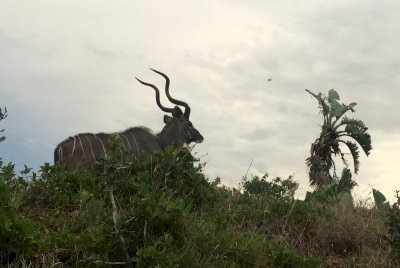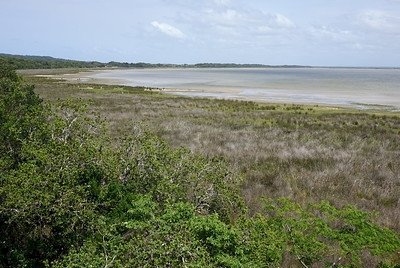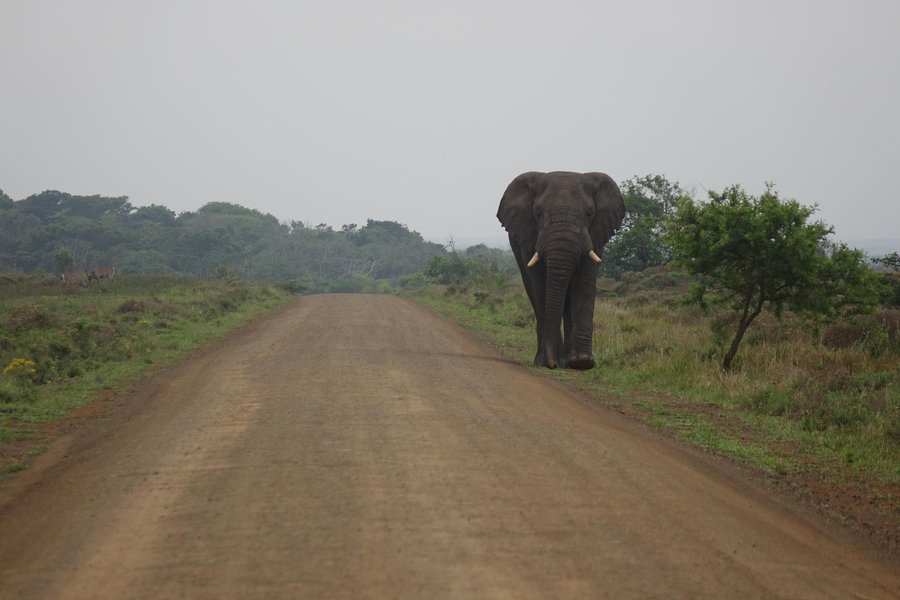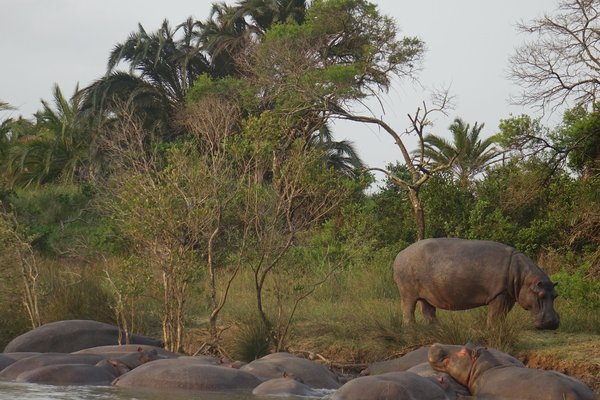Mozambique, South Africa
iSimangaliso Wetland Park – Maputo NP
iSimangaliso Wetland Park – Maputo National Park covers five interlinked ecosystems along a 220km stretch of coast of South Africa, plus Maputo National Park in Mozambique.
It includes marine areas of the Indian Ocean, sandy beaches, dunes, wetlands, forests, lakes and savannah. Lake St. Lucia has a shifting salinity due to varying climatic cycles. Notable wildlife includes nesting turtles, whales, dolphins, whale sharks and waterfowl.
Community Perspective: iSimangaliso is a huge park with several completely different ecosystems and is easily explored self-driving from the city of St. Lucia, with Cape Vidal most recommended for the views. The area is touristy and its specific water-related values are often overlooked in favour of the reintroduced Big 5 fauna. The 2025 extension, Maputo National Park, has been covered by locals.
Site Info
Official Information
- Full Name
- iSimangaliso Wetland Park – Maputo National Park (ID: 914)
- Countries
- Mozambique South Africa
- Status
-
Inscribed 1999
Site history
History of iSimangaliso Wetland Park – Maputo NP
- 2025: Extended
- To include Maputo National Park (Mozambique)
- 2025: Name change
- From iSimangaliso Wetland Park to "iSimangaliso Wetland Park – Maputo National Park" upon extension
- 2022: Revision
- As Maputo NP: Successor to Ponta de Ouro Protected Marine Area (2008)
- 2008: Name change
- From "Greater St Lucia Wetland Park" to "iSimangaliso Wetland Park"
- 1999: Inscribed
- Inscribed
- Type
- Natural
- Criteria
- vii
- ix
- x
Links
- UNESCO
- whc.unesco.org
- Official
-
- isimangaliso.com — iSimangaliso Wetland Park
All Links
UNESCO.org
- whc.unesco.org — whc.unesco.org/
Official Website
- isimangaliso.com — iSimangaliso Wetland Park
News Article
- March 28, 2022 dailymaverick.co.za — Fears mount over ‘free-for-all’ iSimangaliso forest invasion
- Dec. 10, 2017 zululandobserver.co.za — Critically endangered turtles released
- Nov. 8, 2016 uk.blastingnews.com — Rhino poacher shot in iSimangaliso
- June 20, 2016 traveller24.news24.com — iSimangaliso water beetles face uncertain future as drought intensifies
- Dec. 12, 2015 uk.blastingnews.com — iSimangaliso loses well-loved white rhino family to poachers
- Jan. 31, 2014 iol.co.za — iSimangaliso-St Lucia has been targeted as carbon dioxide storage dump
- May 23, 2013 iol.co.za — Poachers take aim at rhinos in iSimangaliso
- Dec. 22, 2011 iol.co.za — 8 holidaymakers evicted from Sodwana Bay, iSimangaliso Wetlands
- Feb. 27, 2009 news24.com — World renowned Lake St Lucia, home to hundreds of crocodiles and hippopotami, suffers from acute dehydration.
- May 27, 2007 allafrica.com — New Name for SA's First World Heritage Site. The new name is iSimangaliso Wetland Park.
Community Information
- Community Category
- Natural landscape: Rivers, Wetlands and Lakes
Travel Information
Transboundary sites
South Africa, Mozambique
Recent Connections
-
Oceanic Dolphins
“the abundance of dolphins and migratio…
-
Eagles
African Fish Eagle
-
Extended
2025
Connections of iSimangaliso Wetland Park – Maputo NP
- Geography
-
-
Indian Ocean
-
Estuary
The park "includes a wide range of pristine marine, coastal, wetland, estuarine, and terrestrial environments which are scenically beautiful and basically unmodified by people." (Official description)
-
- Ecology
-
-
Crocodiles
-
Dunes
Coastal dunes -
Elephants
Reintroduced -
Hippos
"among others has megaherbivores such as rhino and hippo" (AB ev) -
Lions
uMkhuze section: reintroduced in 2013, now there are about 16 specimens (2022) -
Living Fossils
CoelacanthSee en.wikipedia.org
-
Mangroves
-
Ratites
Somali ostrich -
Rhino habitat
Black and white rhino -
Over 100 mammal species
"GSL is also known for 97 terrestrial mammal species and 32 marine mammals including dolphins and whales" (IUCN ev) -
Coral
coral reefs -
Eagles
African Fish Eagle
-
Oceanic Dolphins
“the abundance of dolphins and migration of whales and whale sharks off-shore” (OUV): Common Bottlenose, Indopacific Bottlenose (UNEP-WCMC)
-
Turtles and tortoises
Habitat of loggerhead and leatherback turtles -
Whales
Winter migrations of humpback whale and southern right whale -
Reintroduced Species
"In 2001 Elephant was introduced into the wetlands system and this has brought this area closer to "big five" status and has re-introduced a key ecological vector". And "Wild dogs, last seen in the northern parts of KwaZulu Natal more than 75 years ago, were reintroduced into South Africa's Greater St. Lucia Wetlands Park on May 5, 2005" -
Bird Migrations
The African-Eurasian Flyway: the park is a major breeding area and refuge for migratory waterfowl and waders (AB ev) -
Critically endangered fauna species
(South-eastern) Black Rhino -
Swamps and Marshes
"These include ..., swamps, and extensive reed and papyrus wetlands" (OUV), "A major threat to the Park is damage to the hydrology and salinity of the wetland system including reduction in the water supply by the transformation of the upper Mfolozi Swamps by agriculture." -
Flamingos
"large aggregations of flamingos" (Brief synthesis OUV) -
Pelicans
"the huge numbers of waterfowl and large breeding colonies of pelicans, storks, herons and terns are impressive and add life to the wild natural landscape of the area." (Official description)
-
- World Heritage Process
-
-
First inscriptions
South Africa: three inscriptions in 1999, with iSimangaliso Wetland Park as the first recorded and with the lowest number -
Country gained extra WHS by an extension
2025
-
Extended
2025
-
Transboundary sites
South Africa, Mozambique
-
Perfect Inscriptions
1999 -
Extension Supported
"The Committee noted the possible extensions of the Greater St. Lucia including a possible future transfrontier site with Mozambique." (Decision 23 COM VIII.A.1 - State Party initiated but welcomed) -
Extensions on Tentative List
Maputo National Park (Mozambique)
-
- Human Activity
-
-
Papyrus
the Mkuze and Mfolozi swamps with swamp forest, extensive reeds and papyrus wetlands (AB ev)
-
- WHS on Other Lists
-
-
World Heritage Forest Programme
-
Biodiversity hotspot
Maputaland-Pondoland-Albany -
Ramsar Wetlands
St. Lucia System+Kosi bay + Lake Sibaya + Turtle Beaches/Coral Reefs of Tongaland -
Important Shark and Ray Areas (ISRAs)
Western Indian Ocean (ISRA Region 07) -
Centres of Plant Diversity
Af59 Maputaland Pondaland Region - "over 6,500 plant .. species recorded from the Park"
-
- Timeline
-
-
Holocene
See "Formation of Lake St Lucia" on page 3 of the linked pdf.
-
- WHS Names
-
-
Name changes
Complete name changes - "iSimangaliso Wetland Park" was inscribed as "Greater St Lucia Wetland Park" and was officially changed in 2008
-
News
- dailymaverick.co.za 03/28/2022
- Fears mount over ‘free-for-all’ iS…
- zululandobserver.co.za 12/10/2017
- Critically endangered turtles rele…
- uk.blastingnews.com 11/08/2016
- Rhino poacher shot in iSimangaliso
Recent Visitors
Visitors of iSimangaliso Wetland Park – Maputo NP
- Ali Zingstra
- Ask Gudmundsen
- Atila Ege
- BaziFettehenne
- Bernard Joseph Esposo Guerrero
- Bram de Bruin
- brornt
- Christoph
- Csaba Nováczky
- Daniela Hohmann
- Dan Pettigrew
- Elaine McArdle
- Els Slots
- Eva Kisgyorgy
- Felicité
- Flexiear
- FS
- Gary Arndt
- Gernot
- Hdhuntphotography
- Iain Jackson
- Ingrid
- Javier
- Jay T
- Jens
- Joyce van Soest
- Kjlauer
- Knut
- Kurt Lauer
- La Concy
- leroykstlj
- lynnz317@aol.com
- Martin
- Michael Ayers
- Michael Novins
- Mihai Dascalu
- Milan Jirasek
- MMM
- Morodhi
- Nasebaer
- Nihal Ege
- Pat Martin
- Paul Schofield
- Philipp Leu
- Qin Xie
- Rachel Perkins
- Ralf Regele
- Randi Thomsen
- Rick Ohm
- Roman Bruehwiler
- SirLoydd
- Solivagant
- Stanislaw Warwas
- Svein Elias
- Szucs Tamas
- Tamara Ratz
- Thomas Buechler
- Thomas Harold Watson
- Thomas van der Walt
- Traveling Girl
- Zoë Sheng
Community Reviews
Show full reviewsTraveling Girl
iSimangaliso Wetland Park – Maputo NP
iSimangaliso Wetland Park – Maputo NP (Inscribed)

My visit to the iSimangaliso Wetland Park in the St. Lucia area was in February 2020. This is summer and off peak for tourism. We were a party of 3, and self driving. The small town of St. Lucia was tourist friendly, affordable, and easy to navigate. We had come from the Drakensburg area, so it was a long drive to St Lucia, but the roads are good and this posed no challenges. We had one experience of being overcharged for snack items at a gas station.
The wetlands park covers a large area, and we visited the region over a course of 3 days. The first visit was on the Hippo tour boat. This was easy to book via our BnB host and pay with a credit card. The boat tour people picked us up at our BnB and took us to the boat launch area. The launch area was through a former industrial area, but we were on the water quickly and uneventfully. Immediately, we paused to enjoy colorful yellow weavers building nests. The flock was large and appeared to be thriving. After the photos were taken, we headed upstream to the first pod of hippos. The hippo pod was of perhaps 20-25 visible members, and the captain maneuvered the boat very close for many photo ops. The second pod was about the same size- 20 or so individuals visible-- and at that juncture one more boat was on site. We also saw a few eagles, egrets, …
Keep reading 0 comments
iSimangaliso Wetland Park lies well on the main tourist trail around South Africa. It’s a huge park, stretching for 220km along the Indian Ocean coast until the border with Mozambique. It also has a 5 km wide marine component along the whole coastline. I stayed for 3 nights in the town of St. Lucia, which is the tourist capital and the main access point to the park.
Because of its size, there are completely different ecosystems to be enjoyed. For the marine part, I had set my eyes on a whale-watching tour. But unfortunately, it was cancelled due to strong winds. So what I mainly did was drive around by myself. From St. Lucia there are two gates into the park, one to the Eastern Shores and one to the Western. The park is remarkable for South African standards as it is very green. No shortage of rain here, compared to the severe drought much of the rest of the country suffers from.
On my first morning, I entered via Bhangazi Gate, which leads you to the Eastern Shores ending at Cape Vidal. For the best part, the drive goes through a savannah. Prominent inhabitants are the Greater Kudu (quite big indeed) and other cloven-hoofed mammals such as the Common Reedbuck. All loop roads from the main road were closed for maintenance, but the various viewpoints were accessible. They will give you views over the coastline, one that is remarkably similar to the all-too-familiar Wadden Sea.
This …
Keep reading 0 comments
I am overjoyed to say that today was a victory for the resident/semi dolphins and migratory whales within the Ponta do Ouro Marine Protected Area. The management plan has been approved and presented which means that the dolphin and whales have more protection within the waters. Well done to all involved in making it a better place for these intelligent beings that live in the ocean! Now we are looking forward to the area gaining World Heritage Site Status!
For the Love of Dolphins!
Keep reading 0 comments
A partial marine protected area was declared in July 2009.
It is now June 2011 and we are STILL waiting for the management plan to be gazetted. During this time, the area is seeing the unsustainable growth of coastal tourism and there is fear of a Port Development within the reserve!
World Heritage Site Status would put a stop to the Port!
Would it not?
Keep reading 0 comments
Ponta D'Ouro in Mozambique is exquisite. I love going there, but during peak holiday season the natural peace is destroyed by quad bikers and jet ski's. The jet ski's especially should be banned. They are noisy and have no consideration for swimmers in the bay. I would imagine that they also would chase away dolphins and whale sharks. For me, it brings down the quality of the esperience of visiting there. I hope there is some intervention. Already, high-end tourism - which pays more and understands the value of pristine nature has moved elsewhere.
Keep reading 0 comments
I visited the Sodwana area, that is linked to the iSimangaliso Wetland Park, for the first time this past December as a diving vacation.
Although the diving was great I have to admit that the experience was tainted by reports of racism and hard-handed treatment of guests to the park by park official - specifically on New Year's day. There are apparently some video evidence of the teargassing of a family trying to leave the park on the 1st of January and I hope that the owner will also publish that.
The mess that greeted us on the 2nd of January, when we wanted to dive again, was also not becoming of a World Heritage site. Despite a "No Alcohol" rule on the beach, the road to the park, as well as the beach was littered with empty bottles and other rubbish. This only finally cleared after about 2 days.
This is such a sad state of affairs, since the area is really great and the reef is great for diving! Hopefully enough people will make their voices heard to force some kind of action on this.
Keep reading 0 comments
The St. Lucia estuary is one of the unique biosystems on this planet, with the subtle interplay between marine and terrestrial aquatic life. This is the only place where I've seen sharks swimming in the lagoon next to hippopotamuses, and crocodiles swimming in the sea!
There are many beautiful woodland paths to explore and the warm Indian Ocean is great for swimming. This is also the only place where I've seen a barracuda jumping over the surf, from the shore! There is an abundance of fauna and flora to admire in the protected areas as well.
The cheapest way to stay is on one of the camping grounds, although there is luxury accommodation as well. Public transport is poor so it is recommended that you make your own arrangements to get around.
Keep reading 0 comments
